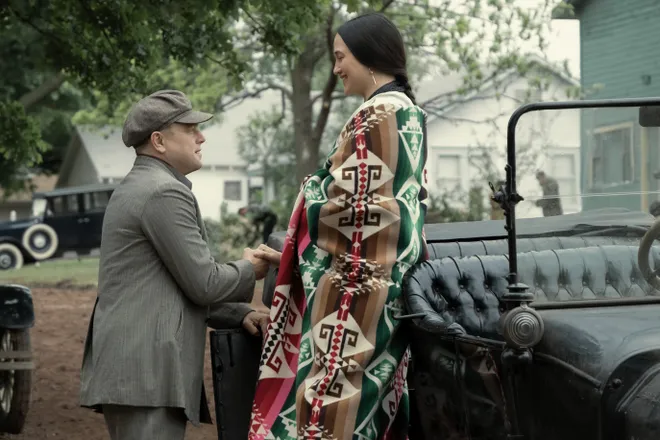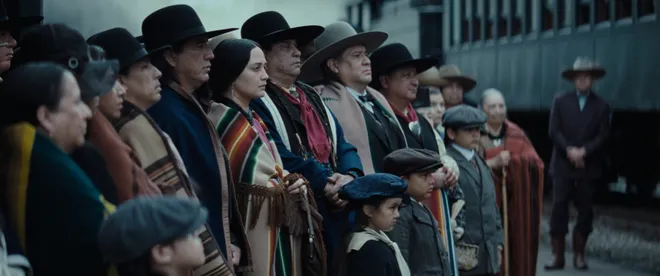In 'Killers of the Flower Moon,' Martin Scorsese crafts a gripping story of love, murder
Martin Scorsese crafts a powerful and awesome crime story with “Killers of the Flower Moon.” And this might be the most impressive aspect of a terrific movie: The legendary filmmaker makes every minute of its 3 ½ hours narratively important and essential.
There’s no filler in the true-life "Killers" (★★★★ out of four; rated R; in theaters Friday), based on the 2017 David Grann book about the Osage murders in 1920s Oklahoma. Armed with a stellar ensemble led by frequent Scorsese collaborators Leonardo DiCaprio and Robert De Niro – with a stunning breakthrough performance by Lily Gladstone – “Flower Moon” is a gripping story about true love and white greed that wrestles with America’s complicated history concerning its indigenous people. This is top-shelf Scorsese and as with his best movies ("The Wolf of Wall Street," "The Departed"), “Flower Moon” is as entertaining as it is thoughtful.
“Killers” centers on the Osage Nation, a Native American tribe that became extremely wealthy when oil was found on its land and members had "headrights" (the right to payments from a collective trust) that at first could be inherited by outsiders. That’s important to know as the film starts, when World War I veteran Ernest Burkhardt (DiCaprio) arrives in the town of Fairfax to work for his uncle, politically minded cattle rancher William King Hale (De Niro). King has a good relationship with the Osage people and, although he considers them “sickly,” pushes his nephew to consider courting a Native American woman.

Ernest meets Mollie (Gladstone), a quiet but clever Osage woman he drives to and from town. The place is full of wild white dudes racing around in cars, but Mollie finds a certain charm in Ernest. (She describes him to one of her sisters as handsome but kind of a “coyote.”) They get to know each other, he meets her mom (Tantoo Cardinal) and is introduced to Osage traditions, and they eventually marry and start a family.
At the same time, Osage deaths begin to pile up. Some are deemed suicide, some aren’t even investigated, but to anyone paying attention, tribe members are being targeted. Tragedy hits home for Mollie, as relatives die due to foul play, and she’s forced to question whom she trusts most. Ultimately, the FBI shows up – led by ex-Texas Ranger Tom White (Jesse Plemons) – as the well-paced narrative rolls to a conclusion as characters make hard decisions about family members.
'Killers of the Flower Moon':Martin Scorsese debuts trailer, chats with Leonardo DiCaprio

Scorsese masterfully weaves together different genres in concert, some of them unlikely: There’s a bit of romantic comedy in the early stages of Ernest and Mollie’s relationship before all the murder mystery, domestic drama, courtroom thriller and gangster-flick elements. The script by Scorsese and Eric Roth puts an emphasis on the Osage mindset and plight with a sprinkling of dark humor, the cinematography is amazing and a stirring final score by the late Robbie Robertson keeps the intimately sprawling tale humming.
From top to bottom of the cast, Scorsese has the ability to wring the best out of his thespians. De Niro is simply on another level when working with the director, and “Flower Moon” lets the actor balance a certain small-town likability with predatory menace. Scorsese puts together some intriguing interactions: Movie fans will delight at seeing the heavyweight De Niro vs. Plemons, one of the best character actors of his generation, and guys like John Lithgow and Brendan Fraser make the most of their supporting turns.

But it’s the dynamic between DiCaprio and Gladstone that gives the film a beating heart. While DiCaprio won an Oscar for “The Revenant,” he’s better here as a devoted husband who's torn between love for his wife and loyalty to (and fear of) an imperious uncle. Gladstone, though, is the most important person on screen, navigating a deep character arc full of love and pain.
The villains are fairly obvious in “Flower Moon,” but Scorsese asks audiences to take a wider look at systemic racism, historical injustice and the corruptive influence of power and money, intriguingly tying together our past and present.

Disclaimer: The copyright of this article belongs to the original author. Reposting this article is solely for the purpose of information dissemination and does not constitute any investment advice. If there is any infringement, please contact us immediately. We will make corrections or deletions as necessary. Thank you.







